Is your LG refrigerator causing a water leak from the ice dispenser?
Don’t let this inconvenience dampen your kitchen experience! Read this informative blog to learn why this issue occurs and how to fix it.
Learn about the ice dispenser mechanism, troubleshooting, and preventive maintenance. Keep your LG refrigerator running smoothly and say goodbye to water leaks.
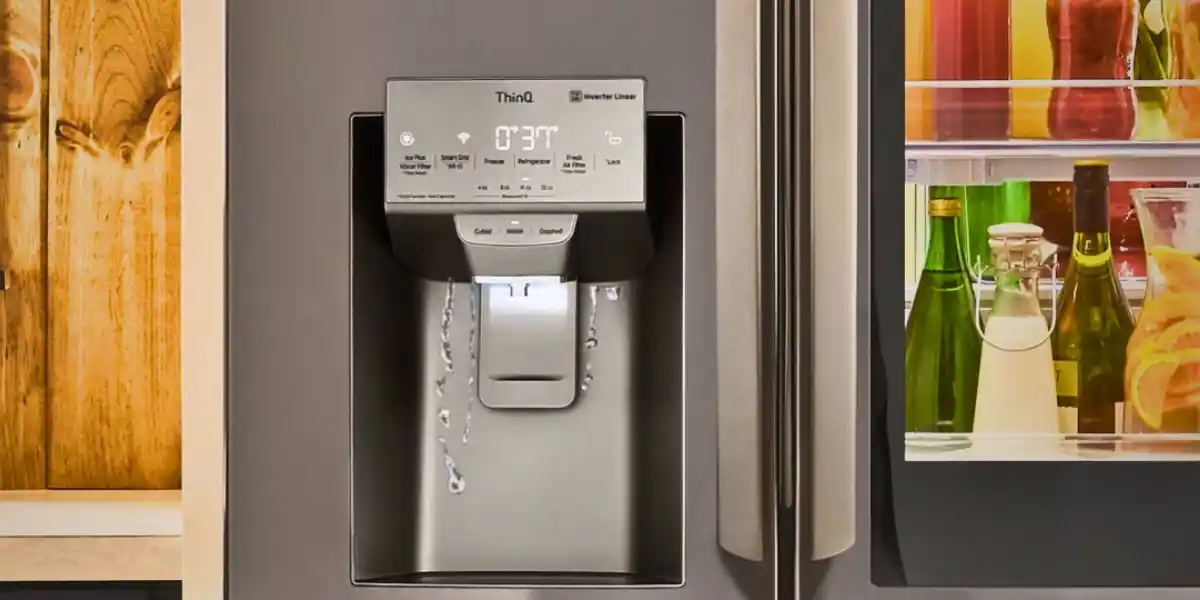
Why is Your LG Refrigerator Leaking Water from the Ice Dispenser?
There are a number of possible reasons why your refrigerator leaks water and here are some of them.
Damaged Water Supply Line:
The first suspect in our investigation is the water supply line. This line connects your refrigerator to the main water source.
Inspect the supply line for visible signs of damage or loose connections. Look out for any cracks, leaks, or improper attachments.
If you detect any issues, tighten the connections or replace the damaged line promptly.
Faulty Water Inlet Valve:
We investigate the water inlet valve, a component that regulates the flow of water into your refrigerator.
Locate this valve at the rear of your appliance and scrutinize it for any leaks or malfunctions.
Excessive moisture or visible damage could indicate a faulty valve. Depending on your refrigerator, you may need to consult the manual or contact a technician.
Obstructions in the Ice Maker Assembly:
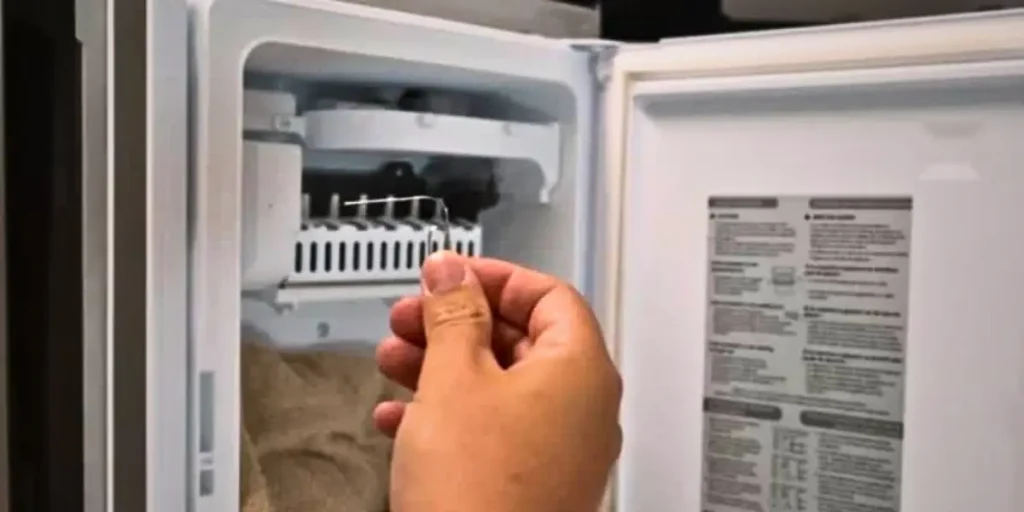
Begin by removing the ice bucket from your LG refrigerator. Thoroughly inspect the dispenser chute and the ice maker itself for any blockages.
Foreign objects or ice buildup can prevent the ice maker from working properly. Gently clear any obstructions using a soft cloth or warm water.
Ensure that the ice maker is level and correctly aligned within the unit.
Misaligned or Damaged Ice Maker Fill Tube:
Our investigation takes an intriguing twist as we investigate the ice maker fill tube. This small but significant tube supplies water to the ice maker for the production of ice.
Check if the fill tube is properly positioned and securely attached. Examine it closely for cracks, blockages, or misalignment.
Adjust or replace the fill tube as necessary to eliminate any potential issues.
Clogged Drain Pan and Drain Line:
Another suspect emerges with a clogged or overflowing drain pan and drains line.
Discover the drain pan at the bottom of your refrigerator, often concealed behind a removable panel.
Clear any debris or stagnant water from the pan using a sponge or towel. With a thin brush or pipe cleaner, thoroughly inspect the drain line for clogs and remove them.
Improper Temperature Settings:
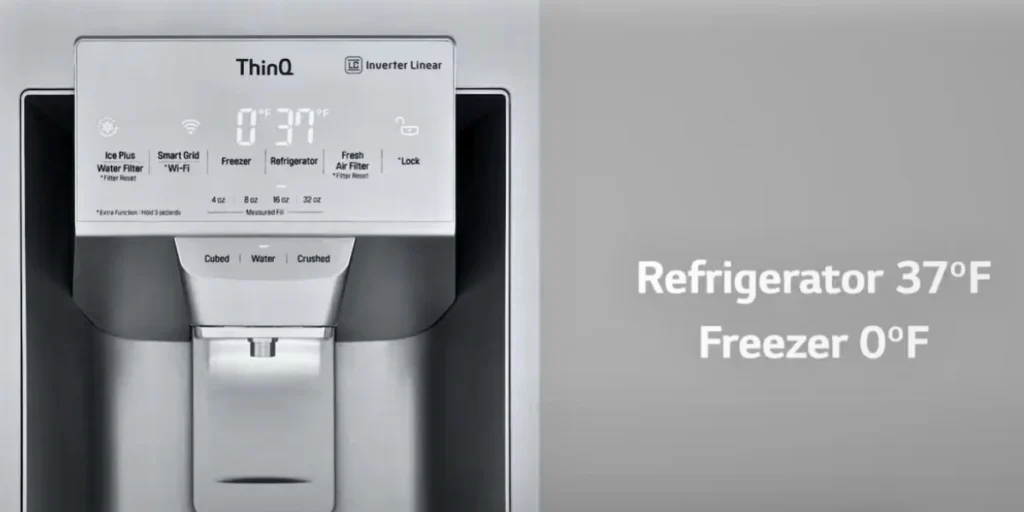
Our final clue leads us to the temperature settings of your refrigerator. Extreme cold temperatures can result in ice blockages, leading to water leakage.
You should set your refrigerator to 37°F or 40°F (3°C or 5°C) and your freezer to 0°F or 5°F. Adjust the settings accordingly to maintain the ideal temperature balance.
Potential Risks and Damages Caused by Water Leakage
There are potential risks and damages associated with the leakage of water from an LG refrigerator.
Structural Damage:
Having a leak in your refrigerator can cause significant structural damage. A refrigerator’s internal components can deteriorate if exposed to water for a long time.
If the water seeps into the flooring or cabinetry, it can cause warping, staining, or even rotting.
Electrical Hazards:
The presence of water in or around your refrigerator poses a significant electrical hazard.
Electricity and water don’t mix well, and a leaky refrigerator increases the risk of short circuits.
Anyone coming into contact with the appliance could be severely injured or even electrocuted.
Mold and Mildew Growth:
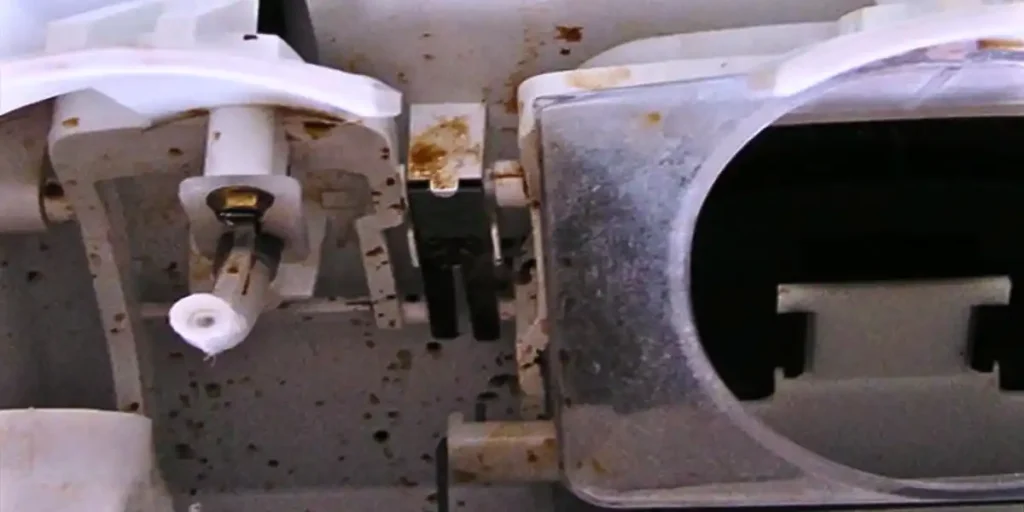
A water leak creates an ideal environment for mold and mildew growth. You can quickly spread these fungi to other areas of your refrigerator when it is damp.
Health risks associated with mold and mildew include unpleasant odors and health risks.
Contaminated Water and Food:
Water leakage can contaminate the water supply and any food stored in the refrigerator.
A faulty water line or inlet valve can cause impurities or bacteria to enter the ice dispenser.
Perishable food items may also be contaminated, posing health risks to you and your family.
Increased Energy Consumption:
Refrigerators with leaks may operate less efficiently, causing them to work harder. This can result in increased energy consumption and higher utility bills.
It can lead to premature wear and tear on the refrigerator’s components over time.
How to Troubleshoot and Fix a Leaking LG Refrigerator Ice Dispenser?
Follow these troubleshooting steps if your LG refrigerator has a leaking ice dispenser:
Check the ice maker supply line:
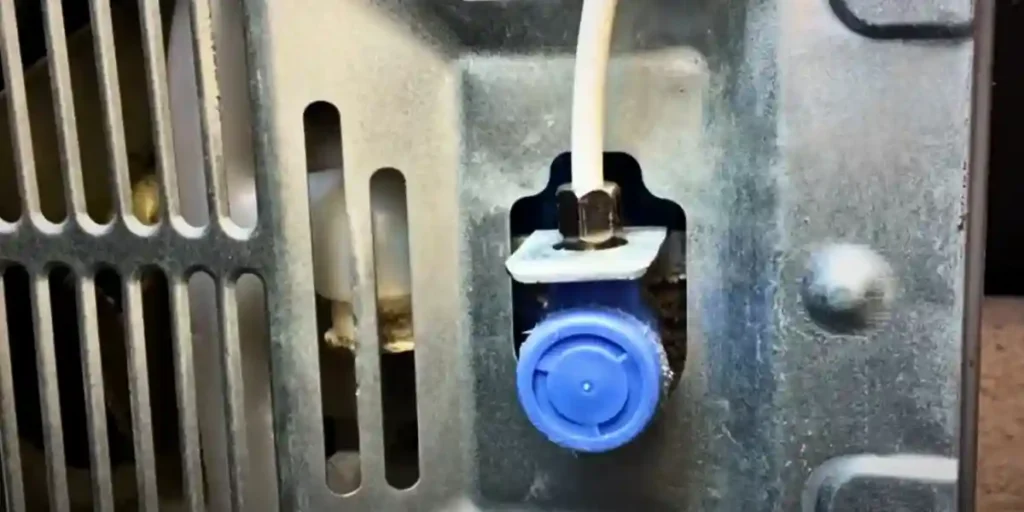
Check that your refrigerator’s ice maker’s water supply line is securely attached and not leaking. If there is a leak, you may need to tighten or replace the supply line.
Inspect the ice chute:
Examine the ice chute where the ice dispenses from. Make sure there are no obstructions or ice build-up that could be causing the water to leak. Clear away any ice or debris that may be blocking the chute.
Check the ice dispenser flap:
The dispenser flap should seal tightly when not in use. When it doesn’t close properly, warm air can enter the freezer compartment, causing frost buildup.
Inspect the flap for any damage or misalignment, and adjust or replace it as necessary.
Verify the water inlet valve:
The water inlet valve controls the flow of water to the ice maker and dispenser. A faulty valve can cause water to leak.
Inspect the valve for signs of leakage or damage at the back of the refrigerator. If you suspect the valve is the problem, it may need to be replaced.
Examine the ice maker assembly:
Sometimes, a malfunctioning ice maker can lead to leaks. Remove the ice maker assembly and inspect it for any signs of damage or ice buildup.
Clean any ice or debris from the assembly and ensure it is properly aligned and functioning.
Check the water filter:
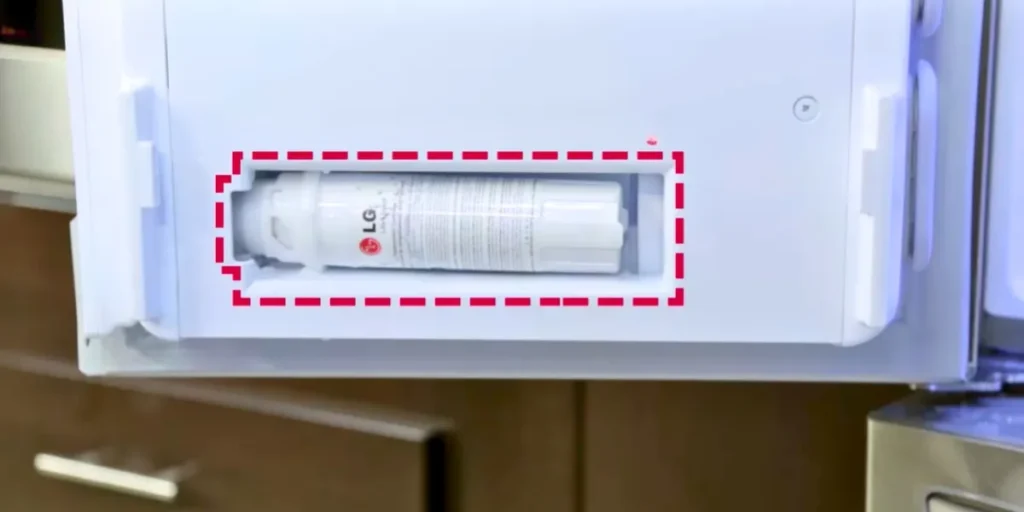
A clogged or improperly installed water filter can cause issues with water flow, resulting in leaks.
Verify that the water filter is correctly installed and not clogged. If necessary, replace the filter according to the manufacturer’s instructions.
Inspect the drain pan and drain line:
Water leaks from the drain pan when it becomes cracked or damaged during defrosting.
Check the drain pan for any visible issues and replace it if needed. Ensure that the drain line is not clogged or obstructed.
Contact LG’s customer support or a professional appliance repair service for further assistance.
Follow these tips to ensure your LG refrigerator’s ice dispenser performs at its best:
Clean the ice dispenser regularly:
Wipe down the ice dispenser area, including the ice chute, with a soft cloth and mild detergent.
Remove any residue or buildup that may hinder the proper operation or cause leaks. Rinse thoroughly and dry the area before using the dispenser.
Replace the water filter on schedule:
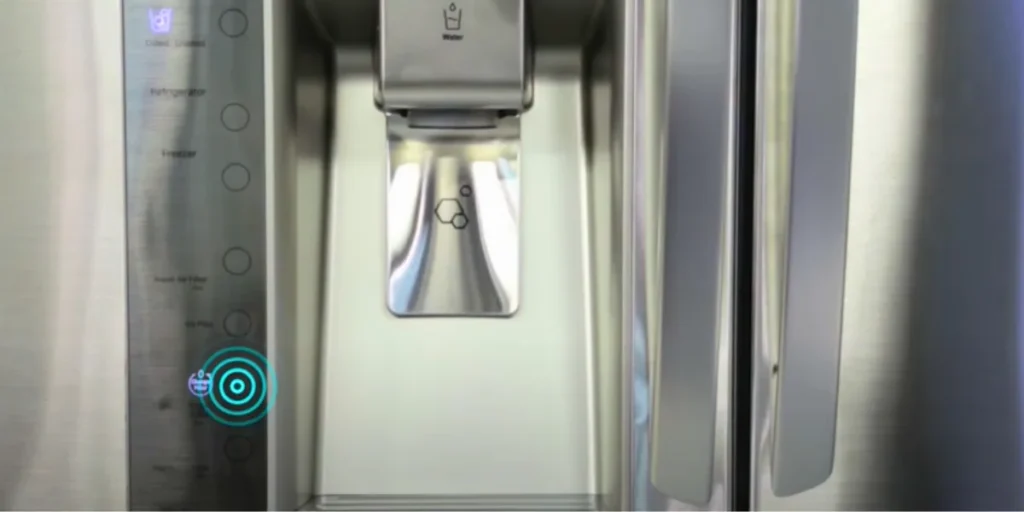
LG refrigerators typically have a water filter that removes impurities from the water supply.
Follow the manufacturer’s instructions to replace the filter at the recommended intervals.
This helps maintain water quality, prevents clogs, and reduces the chances of leaks.
Inspect the water supply line:
Periodically check the water supply line for any signs of damage, such as cracks or leaks.
Ensure that the line is properly connected and not kinked. Repair or replace the water line if necessary if there are any issues.
Check the ice maker assembly:
Take a look at the ice maker assembly for any loose or misaligned parts. Tighten any screws or bolts that may have come loose.
Make sure the components are properly aligned and functioning correctly.
Clean the ice maker mold:
Mineral deposits and residue can accumulate in the ice maker mold over time, affecting ice quality.
Follow the manufacturer’s instructions to clean the mold using a recommended ice maker cleaner.
Regular cleaning will help maintain optimal ice production and prevent clogs.
Inspect the ice dispenser flap:
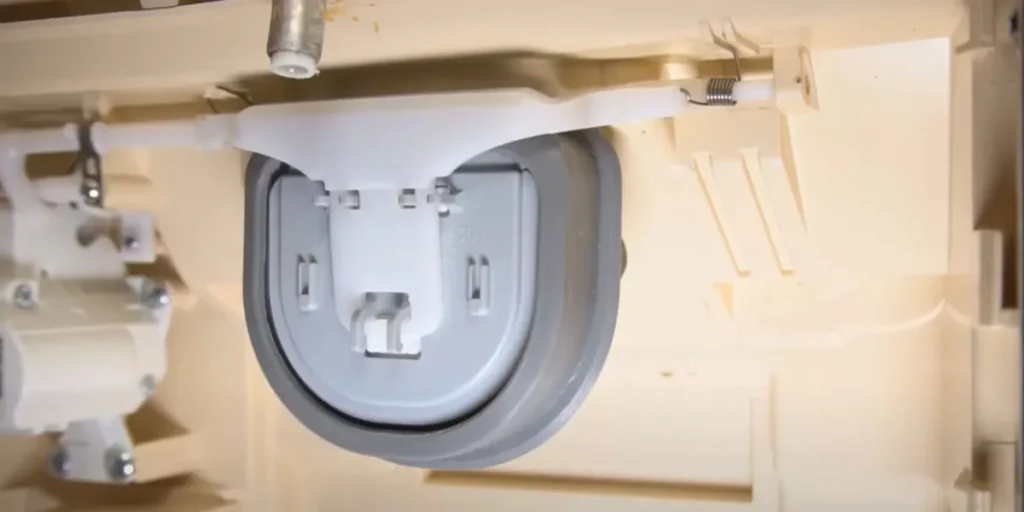
Check the ice dispenser flap to ensure it opens and closes smoothly. Clean the flap and surrounding area to remove any debris or sticky residue that might affect the seal.
To prevent warm air from entering the freezer, consider replacing the flap if it is damaged.
Monitor water pressure:
Keep an eye on the water pressure in your refrigerator’s ice dispenser. An issue with your water supply or a clogged filter could cause a significant drop in water pressure.
Address these problems promptly to maintain the proper functioning of the ice dispenser.
Follow the manufacturer’s guidelines:
Always refer to the user manual or manufacturer’s guidelines specific to your LG refrigerator model.
Details on maintenance tasks, cleaning procedures, and precautions will be included.
FAQs About LG Refrigerator Water Leakage
What Should I Do If The Water Supply Line Is Damaged?
It is important to address a damaged LG refrigerator water supply line promptly to prevent leaks. Start by turning off the water supply to the refrigerator.
Then, disconnect the damaged water line and replace it with a new one. Ensure that the new line is properly connected and securely fastened.
Once the new line is in place, turn on the water supply and check for any leaks.
Can A Clogged Water Filter Cause Water Leakage?
Yes, clogged or incorrectly installed water filters can indeed cause ice dispenser leaks. Clogged filters obstruct the flow of water, resulting in increased pressure in the system.
This increased pressure can result in leaks at the ice dispenser. Maintaining proper water flow and preventing leaks is possible with regular water filter replacements.
Is It Necessary To Clean The Ice Dispenser Regularly?
To prevent leaks in your LG refrigerator, it is vital to regularly clean the ice dispenser. Ice dispensers accumulate dirt, debris, and sticky residue over time, obstructing ice flow.
To prevent buildup, keep the ice chute, dispenser opening, and surrounding area clean.
How Often Should I Replace The Water Filter?
Replacement of the LG refrigerator water filter is generally recommended every six months. Water filters lose effectiveness over time, and can clog, affecting the flow and quality of water.
Water and ice should be replaced regularly to ensure cleanliness and freshness.
Conclusion
Don’t let a leaking ice dispenser in your LG refrigerator dampen your spirits. Fix common issues like damaged water supply lines, clogged filters, or faulty inlet valves quickly.
Your refrigerator will run more efficiently if you clean the dispenser and replace the filters regularly.
Remember, expert assistance is just a call away if you need it. Enjoy a leak-free and refreshing experience with your LG refrigerator’s ice dispenser.
